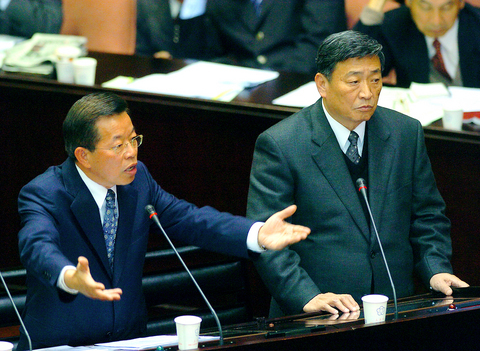The Ministry of National Defense yesterday launched a new campaign promoting the NT$610.8 (US$19.8 billion) bill to procure arms from the US to coincide with the opening of the new legislative term.
"The new wave of publicity skirts sensitive political issues and focuses instead on the significance of national security. We hope to win greater public backing," Political Warfare Department director-general Hu Chen-pu (
He admitted that last year's campaign urging people to "save a cup of tea every day in exchange for weapons" sparked controversy and did little to facilitate passage of the bill.

PHOTO: FANG PING-CHAO, TAIPEI TIMES
Hu said China has just released its annual military budget, which features a 12.5 percent increase in spending on last year.
But China is thought to conceal a large amount of additional military spending within other budgets, so foreign observers have estimated the country's actual military spending at two to three times the official figure, Hu said.
The nation therefore cannot ignore the tipping of the cross-strait military balance, he said.
Hu said the new campaign relies on expert opinion that aggressor nations with three times the military force of a vulnerable nation will win in any conflict, that two times the military force will mean the result is uncertain, but that if the figure is less than one-and-a-half times, victory is not possible.
Ministry research found that the procurement of the desired weapons would close the military gap with China to a factor of 1.67, thereby ensuring Taiwan's security for about 30 years.
Hu said that while some legislators were keen on the idea of approving the arms deal through a referendum, defense issues were a professional matter not suited to a plebiscite.
The new campaign also uses former US president Ronald Reagan's famous words "peace through strength" and the Chinese proverb "no eggs are unbroken when the nest is overturned" on its posters.
The campaign says the procurement package keeps Taiwan up to speed with the rest of the world.
It asks why the US, Japan and the Netherlands purchased Patriot Advanced Capability-3 (PAC-3) missile batteries, why 16 countries, including Japan and South Korea, use P-3C maritime patrol aircraft, and why China strongly opposes the sale of US submarines to Taiwan. The reply is that these are advanced arms.
Hu said the ministry will adopt a three-pronged strategy targeting the public, legislative caucuses and individual legislators to increase understanding of the issue. The campaign will run in newspapers and on TV, as well as on buses and the MRT in Taipei.
Minister of National Defense Lee Jye (李傑) has announced that the NT$610.8 billion weapons procurement expenditure could be cut down to NT$590 billion, reflecting the weakness of the US dollar, and even reduced to NT$480 billion if Taiwan elects not to purchase eight diesel submarines from the US.
However, opposition legislators have asked the ministry to cut the budget by at least NT$380 billion.
The biggest-ever weapons procurement plan in the nation's history would purchase three major items -- three PAC-3 missile batteries, 12 P-3C maritime patrol aircraft and the eight diesel-powered submarines.

Taiwan is to commence mass production of the Tien Kung (天弓, “Sky Bow”) III, IV and V missiles by the second quarter of this year if the legislature approves the government’s NT$1.25 trillion (US$39.78 billion) special defense budget, an official said yesterday. Commenting on condition of anonymity, a defense official with knowledge of the matter said that the advanced systems are expected to provide crucial capabilities against ballistic and cruise missiles for the proposed “T-Dome,” an advanced, multi-layered air defense network. The Tien Kung III is an air defense missile with a maximum interception altitude of 35km. The Tien Kung IV and V

The disruption of 941 flights in and out of Taiwan due to China’s large-scale military exercises was no accident, but rather the result of a “quasi-blockade” used to simulate creating the air and sea routes needed for an amphibious landing, a military expert said. The disruptions occurred on Tuesday and lasted about 10 hours as China conducted live-fire drills in the Taiwan Strait. The Civil Aviation Administration (CAA) said the exercises affected 857 international flights and 84 domestic flights, affecting more than 100,000 travelers. Su Tzu-yun (蘇紫雲), a research fellow at the government-sponsored Institute for National Defense and Security Research, said the air

A strong continental cold air mass is to bring pollutants to Taiwan from tomorrow, the Ministry of Environment said today, as it issued an “orange” air quality alert for most of the country. All of Taiwan except for Hualien and Taitung counties is to be under an “orange” air quality alert tomorrow, indicating air quality that is unhealthy for sensitive groups. In China, areas from Shandong to Shanghai have been enveloped in haze since Saturday, the ministry said in a news release. Yesterday, hourly concentrations of PM2.5 in these areas ranged from 65 to 160 micrograms per cubic meter (mg/m³), and pollutants were

Taiwan’s armed forces have established response protocols for a wide range of sudden contingencies, including the “Wan Chun Plan” to protect the head of state, the Ministry of Defense (MND) said today. After US President Donald Trump on Saturday launched a series of airstrikes in Venezuela and kidnapped Venezuelan President Nicolas Maduro, concerns have been raised as to whether China would launch a similar “decapitation strike” on Taiwan. The armed forces regularly coordinate with relevant agencies and practice drills to ensure preparedness for a wide range of scenarios, Vice Minister of National Defense Hsu Szu-chien (徐斯儉) told reporters before a